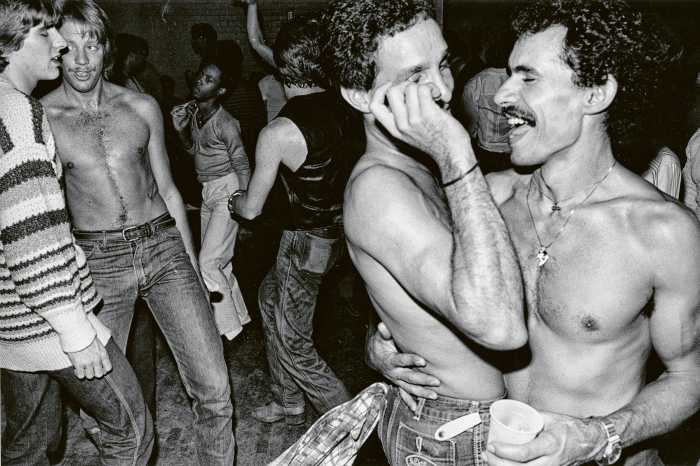Years after a turbulent childhood, Augusten Burroughs can finally laugh about it.
“I’m boring, boring, boring,” confessed the author during lunch in the East Village. “That’s the one thing I think people may be a bit surprised at. I think they expect someone who’s really wacky and artistic and crazy, and I’m, like, as exciting as an accountant.”
That may be true now, but it certainly wasn’t always the case, as illustrated by Burroughs’ hilarious-yet-harrowing new memoir, Running With Scissors.
When Burroughs was twelve his mother relinquished her parental responsibilities and shipped him off to be raised by her shrink, a crackpot who could read fortunes in bowel movements and dubbed his office a “Masturbatorium.” For the next six years, Burroughs lived in squalor with the doctor, his family, and a few lunatic patients in a dilapidated house full of cockroaches, years-old Christmas trees and discarded turkey carcasses. With no adult supervision, the kids of the house did whatever they pleased, which didn’t include any education, formal or otherwise, but did involve, on occasion, an old electroshock therapy machine. Moreover, at an age when most kids are gleaning their first hazy facts about the birds and the bees, Burroughs was navigating an affair with a 33-year-old man.
“That was the hardest thing about writing the book. I hated it. I wrote it last,” said the author, now 36. Burroughs said he worried how readers would react to the liaison. “Here you had a thirteen-year-old kid and a thirty-something guy. That could really turn off a lot of people.” But he never considered leaving the offending material out. “It had to be in,” he said. “It’s part of the story.”
So far, there’s been no uproar of indignation. On the contrary, rocketed by countless glowing reviews, Running with Scissors is already a best-seller. An Entertainment Weekly critic gave the book an “A” grade, and called her review a fan letter.
“I should be paying alimony to her for life,” laughed Burroughs about the write-up. Other critics have compared Burroughs to Tobias Wolff, Roald Dahl, and David Sedaris, thanks to his ability to glean droll humor from even the most nightmarish situations, a talent he developed while writing in his journals as a teenager. “One thing I did learn tonight,” he wrote after his unpleasant first experience with anal sex, “is that Queen Helene’s Cholesterol is more than just a hair conditioner.”
This gallows humor allows readers to laugh, at times uproariously, at situations that might otherwise induce grimaces. It did take many years before Burroughs could even think about his adolescence, let alone laugh at it.
“I spent my whole 20s blocking it out,” said the author, who, at 18, changed his name and moved from his native Massachusetts to San Francisco in search of a normal life. “I didn’t want to think about it, because it was, you know, horrifying in a lot of ways.” But even after a subsequent move to New York, Burroughs failed to fully escape his history. “To come here and have that as a past? Just try to get a date!” he laughed. “Talk about baggage? I was carrying around a steamer trunk.”
According to Burroughs, that “baggage” was the hardest part of his experience to overcome. “To be able to meet someone who is a high quality person and be emotionally available and exposed and trusting, that’s been an almost insurmountable task in my life,” he said. Nevertheless, he achieved it, having found a partner, Dennis, through a personal ad three years ago.
“Dennis is amazing,” effused Burroughs, “he’s brilliant, and funny, and I’m very, very lucky.”
He credits therapy with his eventual transformation, a surprise given his appalling experiences with his psychiatrist/guardian. “I believe in the concept of therapy,” said Burroughs, “but I definitely saw that therapists are only human.” Consequently, Burroughs interviewed countless therapists before choosing the one he continues to see.
Still, some neuroses die hard. “I can be mistrustful of people,” he admitted, popping a fresh piece of nicotine gum into his mouth (he quit smoking six years ago, but remains addicted to the gum). “Also, my threshold for odd, eccentric people is really high. I can tolerate a lot.”
This will come in handy as he prepares for an upcoming promotional tour, which includes a reading in his hometown of Northampton, Massachusetts. “I kind of dread it. I’m worried about who might crawl out of the woodwork and be front row center with a basket of dead squirrels to throw,” said the author, who hasn’t spoken to any of his former foster family in years. Despite his reticence about the Massachusetts reading, Burroughs looks forward to the rest of the tour. Thanks to the advance publicity, he’s sure to encounter larger crowds than those he met while promoting his debut novel, Sellevision. “That book never found its audience,” he said. “It’s finally starting to get some attention, and I’m really glad. It’s a book urban gays would really get into, ‘cause it’s nasty and smart and funny.”
With the release of his memoir, Burroughs can finally close the chapter on his childhood and live the normal life he always dreamed of as a child. Surprisingly, he holds no bitterness about his past. “The downside to having no supervision is obvious,” he said. “But the upside is there’s an enormous room for creativity and self-expression. In a lot of ways, it was fun to be able to do whatever I wanted on a whim and have the full support of all these crazy lunatics behind me.”
































